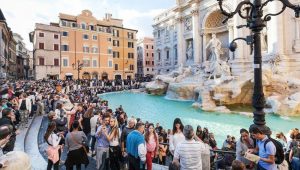The tourism industry is now acknowledged by several institutions such as the UNTWO as one of the industries contributing the most to the economic and social development around the globe (UNTWO, 2020). The sector is by nature service oriented and requires a non-negligible workforce, which generates decent employment and thus encourages the reduction of poverty and inequality. In some cases, it can also drive sustainability development that benefits the environment and the quality of people’s life (UNTWO; 2020, Scheyvens, Hughes 2019). ‘Smart tourism’ is defined as the integration of the information communication technology (ICT) and tourism. This integration enables the implementation of digital technologies to create benefits for the customers and the environment, through the digitalization and the innovation of the tourism products and services (Pesonen 2020, UNTWO 2018). The development of smart tourism enables the transformation of destinations into an ecosystem where all the stakeholders interact to reset the business value preposition, making use of smart technologies such as sensors, virtual intelligence, interactive applications, etc. The aim is to become more sustainable and efficient, offering an invaluable customer experience that combines both the physical and digital elements (Gretzel et al., 2015, Pesonen, 2020).
The creation of smart tourism cities focuses on sustainable development to improve of the quality of life of the locals, the tourists and the conservation of the environment; it therefore aligns with the sustainable goals 2015-2030 implemented by the United Nations (UN). Good examples are European cities such as Lyon, Copenhagen, Vienna, Helsinki and Gothenburg, which are all cities that have developed responsible strategies to intensify the use of the digitalization and hence have become more effective in achieving a sustainable transformation. For instance, they optimized the cities infrastructure to offer a more efficient connectivity, mobility, waste management and more personalized tourism services (Pesonen, 2020; European Capital of Smart Tourism, 2020; Pollack, 2019). The impact of successful smart tourism approaches could increase even further by integrating technology into the whole value chain: production, management, marketing, products and services of the sector to achieve a transformation of the destination (UNTWO 2018). This seems to work well and deliver results in developed countries. For example, in Finland, the city of Helsinki has achieved the integration of sustainability and digitalization in its infrastructure, creating a smart ecosystem in which both locals and tourists benefit from this connection and cohesion. To achieve this, they shifted to the use of renewable energy, open data policy, smart mobility and accessibility and circular economy (Pesonen, 2020; Pollack, 2019). Anyway, the question remains whether it would have the same effect in the case of developing regions. What does it take to make smart tourism reduce poverty and inequality in developing regions?
As a complex and competitive sector, tourism is sensible to social and environment changes, although it shows resilience to adapt quickly and develop new features. The digital transformation, due to rapid technological advances, is a perfect example of how the industry has been capable of implementing smart technologies to connect, inform and use networks, linking different stakeholders within the sector to add value to the whole tourism ecosystem (Cooper, 2008; Neuhofer et al., 2012; Baggio, 2008). As mentioned before, the smart tourism is for many destinations a key opportunity to gain competitiveness and to adjust their actions in order to benefit the society and the environment by connecting the physical and digital environments (Gajdosik, 2018). From this perspective, smart development in tourism is invaluable as it makes the tourist activities and areas accessible to people, locals and visitors, by using networks and offering more sustainable solutions. However, in developing regions where the investment in technology and in the society is reduced, the challenge remains, as technology does not have the same impacts as it has in developed regions.
Going further, many of these developing regions have become tourism dependent, but the industry in many cases does not offer stable working conditions, the job offers are normally seasonal and do not take into account gender and minorities. There is no focus on the development of skills and competences of the workforce and wages are low (Abegg, 2020; Higgins, 2018; Baum et al 2016; Erdem et al., 2016). Additionally, the integration of technology in tourism often benefits only the travellers and the industry players using it, rather than the local people (Castro et al., 2017). Even though tourism already brings benefits to the region, tourism companies could use technology much more, to increase the impact of tourism on the surroundings and the locals. It is true that reducing poverty and inequality is not an easy task and it is difficult to know the best approach to take. However, more actions from the tourism industry and governments are definitely needed to impact positively on the regions less privileged. In this context, keywords such as cooperation and collaboration gain relevance, if considering the aim of developing smart tourism and promote local development and socio-economic growth in these developing regions.
Nevertheless, these initiatives need to be initiated by the governments and certainly require cooperation with stakeholders on a local and global level (Pesonen, 2020; Gajdosik, 2018). The priority should be to focus on actions which benefit local communities more than the industry. The development of smart tourism in developing regions must be focused not only on the creation of digital infrastructure but also on introducing more sustainable policies and regulations that promote local development. It is observable that only the integration of technology and tourism does not guarantee the reduction of inequality. Therefore, a strategy to integrate technology in these regions needs to be adjusted to the specificities of the local area (culture, traditions, etc.) and the needs of the residents must be taken into account, in order to achieve a more sustainable impact through cooperative projects (Castro et al; 2017).





